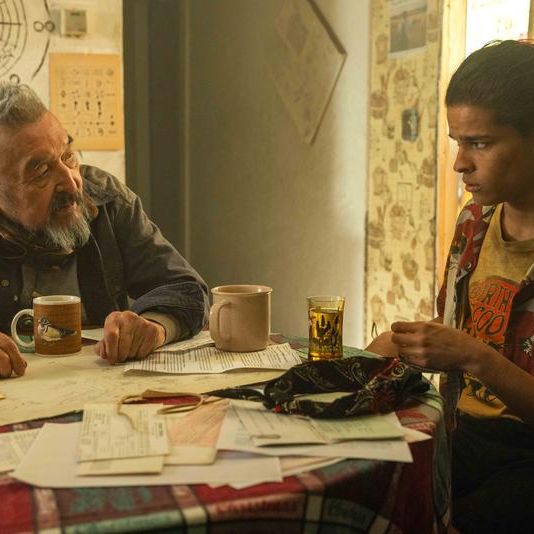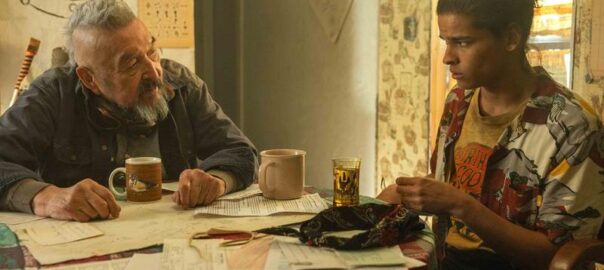[ad_1]

In classic Reservation Dogs fashion, the third season zooms in on one of our core characters, Bear, delivering a quiet and tender episode about trauma, the danger of isolation, and the power of love to reach across time and space. But first, the ghost of a Spanish conquistador rides onscreen and hurls grotesque threats at our poor, thirsty, and exhausted protagonist. Some of the conquistador’s dialogue feels like it’s been pulled out of an early travel narrative that has been adapted into Jodorowsky film, and the whole opening gives off big Holy Mountain vibes (the flat-desert setting is doing a lot of work here) with symbolic meanings that I could maybe talk about more if I were raised more Catholic. In any case, I am all for dunking on the mission system because fuck that noise (and if you’re not convinced/unaware of this nasty part of California history, please read the book Bad Indians, by Deborah Miranda).
So Bear has been separated from the group, partly owing to the intervention of Spirit, and he’s not so subtly being told that the journey he’s going on will teach him valuable life lessons and help him discover a deeper purpose in life. But Bear’s starting to get fed up with Spirit. The two have a spicy back-and-forth, and there’s a lot to unpack in this sequence. Spirit tells Bear about some old-timey (albeit goofy) ceremonies that he used to participate in that were expressions of sacrifice for the community (the eagle-semen bit probably isn’t tradish), but Bear is unimpressed. Bear tells Spirit, “I don’t care what you did a hundred years ago. I need food and water now or I’m gonna die.” Woof. So clearly Bear is frustrated with his current conditions. He’s alone, broke, and feels like he has no purpose (also, he’s in a desert, which is pretty dire), so of course he’s going to be more focused on his immediate needs. It’s a feeling that many Indigenous folks are probably familiar with — it’s hard to feel concerned about your history when the world is literally on fire. But the deeper lesson in the jokes during this sequence is that failing to acknowledge the past is a way of isolating ourselves from all the people and places and other beings that fought to get us here to this moment.
In classic Bear fashion, he lashes out at Spirit, telling him to leave him alone and to stop trying to push him toward … whatever it is he’s being pushed toward. The dejected Spirit cries a single Iron Eyes Cody Tear (you know, that sad Italian man from the 1970s commercial) and, dejected, trots off with his horse. Bear, now finally on his own, is promptly taken out by a dart to the neck, which causes him to pass out.
When Bear awakens, he’s sitting at the dining-room table of Maximus (Graham Greene), a mysterious fellow Okernian who is living in a trailer on an isolated compound somewhere in Texas or Oklahoma (Bear got left behind at the Amarillo bus station). The situation doesn’t seem good: The walls of Maximus’s trailer are covered in strange drawings, photographs, topographic maps, newspapers, and tinfoil. Maximus then proceeds to unload onto Bear his conspiracy theories (aliens, missing Tater Tots) while also implying that he has been institutionalized in his past.
An understandably terrified Bear realizes that he’s trapped and tries to call Spirit back to him, first begging and then reciting the name William Knifeman into the mirror three times (please do this and report back with your findings). Unable to escape, Bear, with Maximus, ends up going out on a tour of the property, which we see is littered with various “experiments” constructed, one would assume, to draw the attention of extraterrestrials, or, as Maximus refers to them, Star People. In his greenhouse, Maximus is growing eggplants as an offering to the Star People (I will now be ordering a hot plate of Star People Food Parmesan at my next visit to an Italian restaurant). Maximus tells Bear that the Star People can take many forms, manifesting even as a feeling that one has to keep faith in.
Maximus then shows Bear some home movies that he’s kept from his time in Okern. While explaining the films to Bear, some familiar names such as Brownie and Irene come up, meaning Maximus is intimately familiar with the kinds of struggles Bear’s been facing in his community. He then explains to Bear that he has been horribly punished for his own visions of beings from elsewhere, having been institutionalized and subjected to electroshock therapy against his will (later, we find out that he is a boarding-school/residential-school survivor as well). Maximus has not had an easy life, and his struggles have been compounded by his lack of a close community and people to share his ideas with. In Bear, he sees a kindred spirit (no pun intended) because they both experience visions of beings that other people can’t perceive. When Bear admits that his friends do support him and don’t question his visions, Maximus poignantly replies, “Well, then, what’s your fucking problem?” Bear is being served an important message not to take the gifts of his visions and his community for granted.
The tragedy of Maximus’s character is that he is being further driven into isolation because he feels his friends and community abandoned him. He tells Bear that he “hates human beings” and that he is “better off looking up and around.” While this is a reasonable and understandable response to the trauma he’s endured, Maximus’s disconnection from his community is only pushing him further toward the edge. It’s an important lesson for Bear — while there are healthy ways to be alone, isolation can also be harmful. Later, Maximus also tells Bear that “in order to observe the universe, you must put your back to the future and fix your eyes on the past.” What he’s alluding to here is the fact that what we perceive as stars presently shining in the night sky are actually lights traveling to Earth from 5,000 years ago. It’s a kind of inverse version of Bear’s earlier jab at Spirit (“I don’t care what you did a hundred years ago”) but one that can create just as many problems. Maximus has turned toward the night sky as a way to seek community, but in the process, he might have lost track of those in his present who may also love him. And the tragedy of it all is compounded by the fact that he was set on this path by forces outside his control (colonialism, namely). Despite it all, though, Maximus refuses to let go of love. He’s out there loving the best he can, whether we perceive it or not.
The next morning, Bear and Maximus awaken to see that cops and social workers are descending upon the house (in a short shot from his POV, we see that Maximus sees this crowd as Star People). Bear sneaks out but not before sharing with Maximus that he believes in his perception of the Star People. We see Maximus calmly get in the back of a car, presumably to be taken to another institution. It’s a heartbreaking sequence, knowing what Maximus has experienced in the past and the mistreatment that Indigenous peoples face within many institutions when trying to access mental-health services.
More symbolism! Bear escapes from the compound by traveling through an underground tunnel (I’m thinking of all the Indigenous emergence stories that involve traveling through tunnels to other worlds), and he again sets off down an uncertain road. Where will this journey take him next? In the season premiere, Spirit explained that Bear would find his way by assisting others — does this mean we will see more of Maximus again later in the series?
• I want to praise Greene, who portrays Maximus, for masterfully toeing the line between funny and frightening. Many folks may recognize him from his Academy Award–nominated performance in Dances With Wolves. Or maybe you caught his brief cameo last year in The Last of Us (that character honestly feels like an alternate-reality version of Maximus, except in that apocalypse, he has an auntie around to help him keep his shit together). Or perhaps, if you’re my dad, you’ll know him from his recent stint as a baddie on the A&E series Longmire. If you are at all compelled by the performance he gives in this episode, I highly recommend checking him out in the 1991 indie film Clearcut (it’s an amazing movie, mostly because of Greene’s performance as Arthur as well as the behind-the-scenes influence many of the Native actors had on the film).
• I don’t really have much more to add here. This episode was quiet and subdued, and a lot of television isn’t right now, so I love that. Most of the story is carried by a small cast, which shows that you don’t need tons happening to tackle big ideas in a big way.
• Go, uh, call that uncle of yours you haven’t heard from in a while.
[ad_2]
Source link
